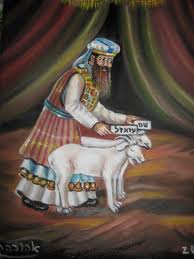Portion Achrei - Mot

To COME BEFORE G-D
At the beginning of Parshas Acharei, G-d tells Moses to instruct his brother Aaron, the head priest, that he is to wear linen vestments when he enters the innermost chamber of the Tabernacle, the Holy of Holies, on Yom Kippur. Ordinarily the Kohen Gadol (the head priest) would wear vestments. That included gold. Upon entering the Holy of Holies, however, he has to wear plain linen vestments like those of an regular Kohen.
Rashi explains the reason for this as follows: "A prosecutor cannot become an attorney for the defense." Since gold had been used to make the Golden Calf, which some of the Jews had worshiped, it was inappropriate that the Kohen Gadol should wear gold when entering the Holy of Holies to gain forgiveness for all the Jewish people; it would serve as a reminder of their sin.
When the Kohen Gadol, the saintly representative of the Jewish people, entered the most sacred place in the world, the holy of Holies, on the holiest day of the year, Yom Kippur, there was a conjoining of the most sacred aspects of the three elemental dimensions - time, space, man. All other aspects of the service of the Kohen Gadol during Yom Kippur were but a prelude to this epochal event, at which time he was able to gain pardon for the sins of his people.
For the head priest to wear vestments interwoven with gold during the rest of Yom Kippur was inoffensive; wearing these golden vestments - reminiscent of the Golden calf - in the Holy of Holies, at the very moment that he was striving to obtain pardon for all past sins, was unthinkable.
The service of the head priest on Yom Kippur, like Yom Kippur itself as a whole, brought about not only atonement, but also a state of purification before G-d, as the verse states, "For on this day shall atonement be made for you, to purify you; you shall be cleansed of all your sins before G-d".
The spiritual cleansing of sin and achieving a state of standing "before G-d" is, of course, not limited to Yom Kippur. While that day is more conducive than other days to achieving a lofty spiritual state, a Jew is able to affect both himself and others every day of the year. All Jews, on every single day of the year, may attain the level of being "before G-d" - drawing closer to Him, and to His Torah and Mitzvoth.
However, in order for this state to be achieved, a Jew must know that he must first enter into a spiritual "Holy of Holies" - a state of internalization, of inwardness. The individual must seek to plumb the depths of his soul and have it illuminate his whole being. When this is achieved, atonement and purification may be obtained both for himself and for others.
How is one to achieve such a state? - By divesting oneself of self-aggrandizing garments, the garments of gold. So long as one is preoccupied with banalities such as self-importance, one cannot be sensitive to one's innermost dimension, nor enter the innermost chamber - the true and ultimate purpose and G-dly intent of Creation.
Only after a person clothes himself in the linen garments of a simple Kohen, i.e., only after achieving a state of true simplicity and humility, can he enter the state of the Holy of Holies, and thereby effect atonement and purification on his own behalf and on behalf of others. Ultimately, he may then reach such a lofty state that, like the Kohen Gadol, he secures "pardon for himself, his household, and for the whole congregation of Israel".